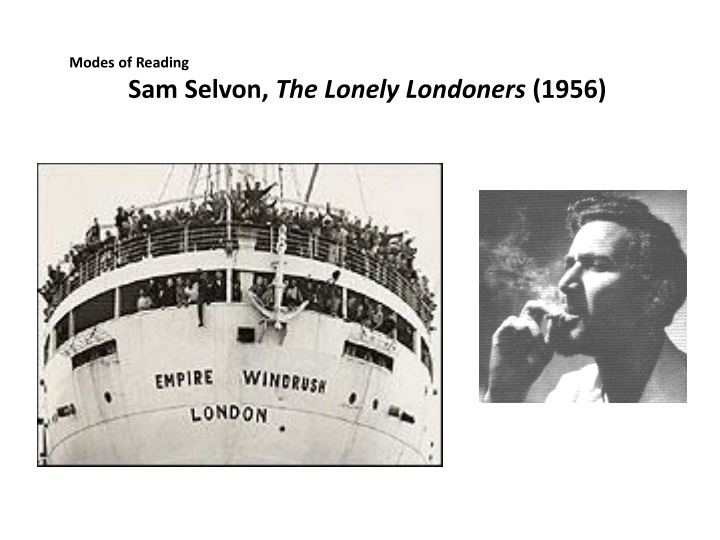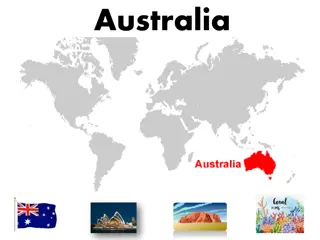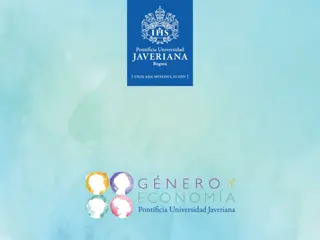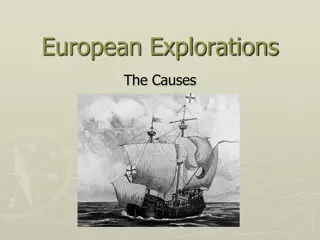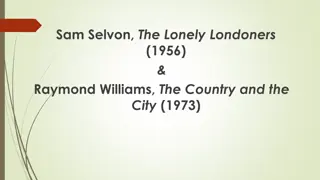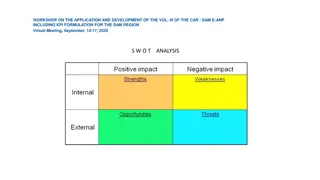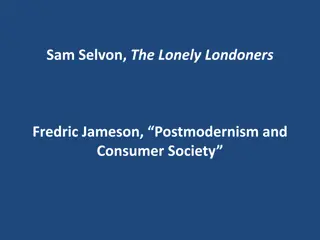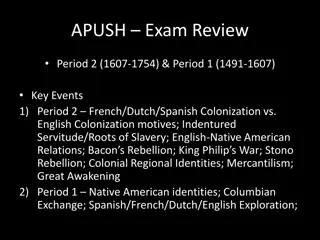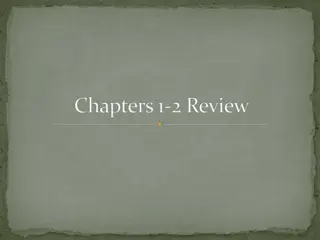Exploration of Identity and Colonization through the Lens of Sam Selvon's "The Lonely Londoners
In Sam Selvon's "The Lonely Londoners," the narrative delves into themes of identity, belonging, and colonization experienced by West Indian immigrants in London. Through vivid descriptions of London's atmosphere and characters like Moses Aloetta, Selvon captures the sense of displacement and longing for home. Louise Bennett's poem "Colonization in Reverse" further reflects on the reverse migration of Jamaicans to England, flipping the narrative of colonization. The text also explores the impact of colonial education on individuals like George Lamming, highlighting the complexities of West Indians' relationship with England.
Download Presentation

Please find below an Image/Link to download the presentation.
The content on the website is provided AS IS for your information and personal use only. It may not be sold, licensed, or shared on other websites without obtaining consent from the author.If you encounter any issues during the download, it is possible that the publisher has removed the file from their server.
You are allowed to download the files provided on this website for personal or commercial use, subject to the condition that they are used lawfully. All files are the property of their respective owners.
The content on the website is provided AS IS for your information and personal use only. It may not be sold, licensed, or shared on other websites without obtaining consent from the author.
E N D
Presentation Transcript
Modes of Reading Sam Selvon, The Lonely Londoners (1956)
Sam Selvon George Lamming
Sam Selvon, The Lonely Londoners [1956], (New York: Longman, 1987), p.23. One grim winter evening, when it had a kind of unrealness about London, with a fog sleeping restlessly over the city and the lights showing in the blur as if is not London at all but some strange place on another planet, Moses Aloetta hop on a number 46 bus at the corner of Chepstow Road and Westbourne Grove to go to Waterloo to meet a fellar who was coming from Trinidad on the boat-train. When Moses sit down and pay his fare he take out a white handkerchief and blow his nose. The handkerchief turn black and Moses watch it and curse the fog.
Wat a joyful news, Miss Mattie, I feel like me heart gwine burs' Jamaica people colonizin Englan in reverse. By de hundred, by de t'ousan From country and from town, By de ship load, by de plane-load Jamaica is Englan boun. What a islan! What a people! Man an woman, old and young Jusa pack dem bag an baggage An tun history upside dung! Colonization in Reverse --- Louise Bennett, 1966 Wat a devilment a Englan! Dem face war an brave de worse, But I'm wonderin how dem gwine stan Colonizin in reverse.
feeling for the English countryside and landscape which had possessed me from schoolday reading of the English poets. In the hot tropical atmosphere I dreamed of green fields and rolling downs, of purling streams and daffodils and tulips, thatched cottages and quiet pubs nestling in the valleys. And I wanted to see for myself the leafless trees covered with snow as depicted on Christmas postcards This was the country whose geography and history and literature I had been educated upon long before I knew that Port of Spain was the capital of Trinidad Sam Selvon, Finding West Indian Identity in London , 1988 He arrives and travels with the memory, the habitual weight of a colonial education [ ] In England he does not need to feel the need to try to understand an Englishman, since all relationships begin with an assumption of previous knowledge, a knowledge acquired in the absence of people known. This relationship with the English is only another aspect of the West Indian s relation to the idea of England George Lamming , The Occasion for Speaking , 1960
George Lamming, The Coldest Spring in Fifty Years, Kunapipi, 20, 1 (1998) pp. 4-10. Can you imagine waking up one morning and discovering a stranger asleep on the sofa of your living room? You wake this person up and ask them What are you doing here? and the person replies I belong here . This was the exactly the extraordinary predicament quite ordinary English people found themselves in when they awoke one morning and saw these people metaphorically on the sofas of their living rooms and the people meaning the authorities who had brought these strangers into the native s living room had not asked permission or invited consultation. On the one hand the sleeper on the sofa was absolutely sure through his imperial tutelage that he was at home; on the other, the native Englishman was completely mystified by the presence of this unknown interloper.
Select Bibliography Brown, J. Dillon, Migrant Modernism: Postwar London and the West Indian novel (Virginia UP, 2013) Fryer, Peter, Staying Power: the history of black people in Britain (Pluto, 2010) Lamming, George, The Coldest Spring in Fifty Years , Kunapipi, 20, 1 (1998) pp. 4-10. Lamming, George, The Pleasures of Exile [1960] (Pluto, 2005) [includes the essay The Occasion for Speaking ] Nasta, Susheila (ed.), Critical Perspectives on Sam Selvon (Three Continents, 1988) Nasta, Susheila and Anna Rutherford (eds), Tiger s Triumph: Celebrating Sam Selvon (Dangaroo, 1995) [includes the essay Finding West Indian Identity in London ] Phillips, Mike and Trevor (eds), Windrush: the irresistible rise of multi-racial Britain (Harper Collins, 1998) [overview of migrant history and first-hand testimony from Windrush travellers] Schwarz, Bill (ed.), West Indian Intellectuals in Britain (MUP, 2003)
